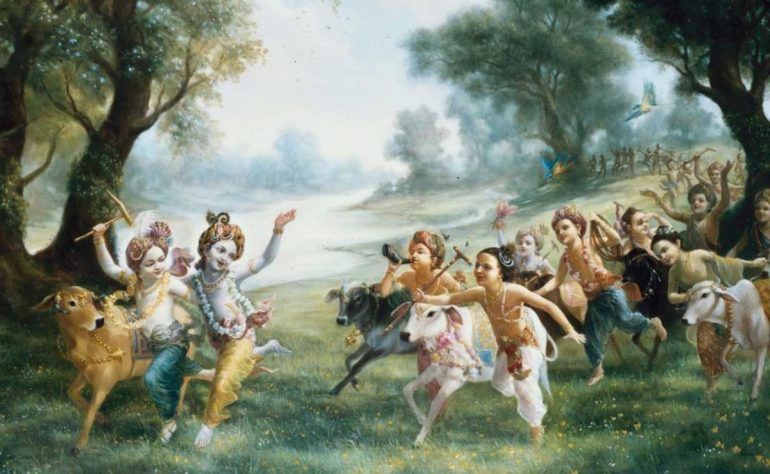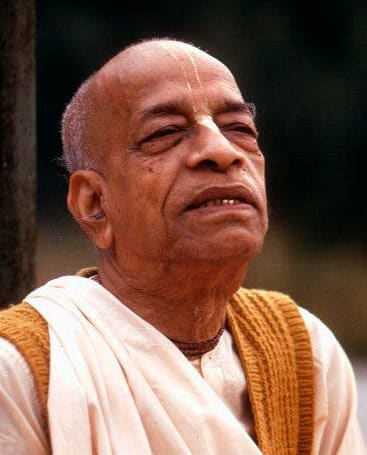
As hard as they may sometimes be, relationships between people form the fulcrum of existence. Our actions and choices are judged on whether they help or hinder the balance of our relationships with others. We humans are by nature gregarious social creature; isolation rarely lasts long and almost never by choice. The Sanskrit wisdom texts offer insight into this universal human trait: personhood is the nature of the soul. We are gregarious not just now, in our embodied state, but eternally.
Some of the oldest treatises on the subject of relationships originated in 15th-17th-century India. These Sanskrit texts are often grouped under the heading of rasa, which refers to the distinct flavor or quality of something. The scholar-practitioner Rupa Goswami is often credited with having developed rasa theology as “the soul’s particular relationship with the divinity in devotional love”. The relationships between “devotees” (lovers of God) and God resemble loving feelings that humans experience with one another, such as lover and beloved, friend and friend, parent and child, and master and servant.
The word rasa has several meanings. The most common is “taste” or “essence.” A traditional Indian dinner, for instance, contains several rasas, or flavors: sweet, salty, spicy, pungent, and so on. When applied to devotion, the word rasa signifies a shade or flavor of loving exchange. Devotees situated in shanta rasa, or the neutral stage, appreciate God with a mood of awe and veneration as the merciful deliverer of fallen souls. The aspiration of such devotees is to study scripture, live in a peaceful place, keep company with saints, and always think of the eternal form of Krishna. Examples of these devotees include yogis who meditate on paramatma, the Supreme Being present in their hearts. In the eternal world, where everything is sentient, even Krishna’s flute and the cows of Vrindavan experience this form of neutral love.
Devotees who feel an active, affectionate attachment to Krishna are described as serving in dasya rasa, a reverential mood of servitude. Devotees in this rasa take shelter in and feel protected by God. Some popular personalities in this mood are Hanuman, the monkey-like warrior-servant of Lord Rama, and Arjuna, hero of the Bhagavad Gita. Devotees in dasya rasa can face all kinds of adversity calmly, knowing they are protected by Krishna. In dasya rasa, devotees honor Krishna as their superior.

In sakhya rasa, friendship, devotees love Krishna as their equal. The mood of a sakha, or friend, is playful, someone who jokes and shares adventures with the Supreme Being. In this friendly mood, Krishna’s identity as the Supreme Being and source of all creation is subdued and secondary to the spontaneous interactions between Krishna and his friends. The cowherd boys of Krishna’s village exemplify this form of love.
Devotees who feel a sense of responsibility for God’s well-being, who treat him as a parent would a child, are situated in vatsalya rasa. Devotees in this parental mood care for Krishna as though he is not self-sufficient, but needs their care and attention. God for these devotees is no longer the providing Father but a dependent Child. Krishna’s mother and father, Nanda and Yashoda, embody this mood of parental love.

The devotees that embody these rasas bow before the position of the gopis, the cowherd women of Krishna’s village, who have no concern for guidelines, responsibilities, or restrictions. Their feelings of conjugal affection for Krishna, madhurya rasa, ignore all social constraints. Their love is unfettered, unconcerned with anyone’s opinion and without regard for consequences. The gopis belong to Krishna—heart, body, and soul.
For a more detailed explanation of the five rasas see Prabhupada’s Nectar of Devotion, 23, 271-357

 Jules is a renowned teacher of asana yoga, meditation, chanting, and yoga philosophy. Jules, who started practicing yoga at age 6, is now considered one of the leading teachers of the Jivamukti Yoga method, teaching the method worldwide as well as facilitating at the very highly regarded teacher training programs.
Jules is a renowned teacher of asana yoga, meditation, chanting, and yoga philosophy. Jules, who started practicing yoga at age 6, is now considered one of the leading teachers of the Jivamukti Yoga method, teaching the method worldwide as well as facilitating at the very highly regarded teacher training programs.



